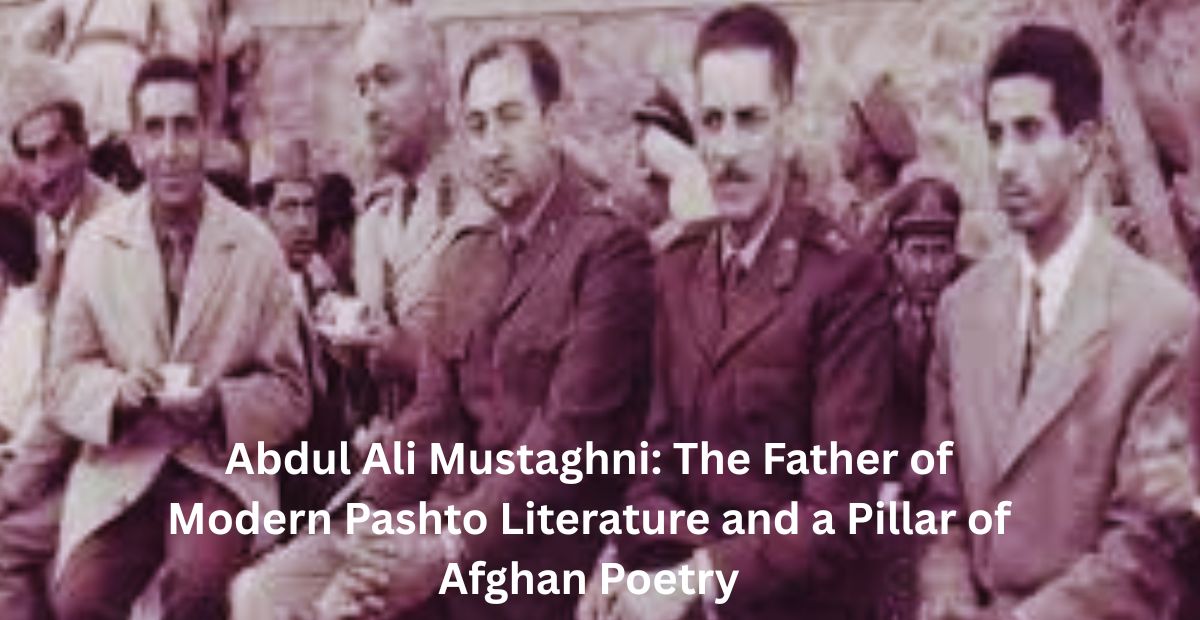Abdul Ali Mustaghni (1875–1933) is widely regarded as one of the most influential figures in modern Persian and Pashto literature. His contribution to Afghan literature has earned him the title of the “founder of modern Pashto literature” from former Afghan President Hamid Karzai. This recognition is a testament to his lasting legacy in shaping the literary and cultural landscape of Afghanistan.
The Life and Legacy of Abdul Ali Mustaghni
Born in 1875, Abdul Ali Mustaghni lived through a period of profound social, political, and cultural changes in Afghanistan. Throughout his life, he sought to capture the essence of his time through his poetry, weaving together themes of love, patriotism, and social justice. His work left an indelible mark on the development of Afghan literature and poetry, influencing generations of poets and writers who followed.
Although Mustaghni is most often associated with his contributions to Persian literature, his work in Pashto also cannot be overlooked. His passion for modernizing Pashto literature and creating a distinctive literary voice for the language is one of his most notable achievements. In fact, his efforts have solidified his place as a leading figure in Pashto literary history, earning him the revered title of “father” of modern Pashto literature.
The Influence of Abdul Ali Mustaghni on Afghan Poetry
Abdul Ali Mustaghni’s poetry not only showcased his mastery of the Persian and Pashto languages but also demonstrated a deep understanding of the cultural and political struggles of his time. His works were deeply reflective of Afghanistan’s complex history, filled with struggles for independence and the fight against foreign influences. Mustaghni’s poetry often served as a vehicle for expressing national pride, exploring themes of unity, and calling for social change.
His poems resonated with the people of Afghanistan, inspiring a sense of national identity and unity in a time when the country was grappling with political turmoil. Mustaghni’s works were revolutionary in their ability to bridge the gap between the traditional and the modern, paving the way for future poets to explore new forms and themes.
Abdul Ali Mustaghni’s Family and the Political Legacy
The legacy of Abdul Ali Mustaghni extends beyond literature. His son, Abdul Karim Mustaghni, played a significant role in Afghanistan’s political history. Abdul Karim Mustaghni was an instrumental figure in the 1973 coup that overthrew King Mohammed Zahir Shah. His political activities have kept the Mustaghni name in the national consciousness, creating a unique blend of artistic and political legacies.
The influence of Abdul Ali Mustaghni’s work and his family’s involvement in the country’s politics highlights the intertwining of culture and governance in Afghanistan. The Mustaghni family’s contribution to both literature and politics provides a deeper understanding of the social forces that shaped Afghanistan in the early to mid-20th century.
Abdul Ali Mustaghni: A Lasting Impact on Afghan Culture
Abdul Ali Mustaghni’s contributions to Afghan literature cannot be overstated. His works in both Persian and Pashto continue to inspire writers, poets, and scholars today. His status as a pioneer of modern Pashto literature places him among the most celebrated figures in Afghan literary history.
Despite the political upheavals and challenges Afghanistan has faced over the years, Abdul Ali Mustaghni’s literary legacy has remained a symbol of national pride. His efforts to preserve and modernize Pashto, alongside his enduring influence in Persian literature, ensure that his works will continue to be studied and appreciated by future generations.
In conclusion, Abdul Ali Mustaghni’s life and works serve as a beacon for those seeking to understand the role of literature in shaping national identity and culture. His poetic voice not only captured the struggles and aspirations of his time but also laid the foundation for the future of Afghan literature. Today, Mustaghni’s name is synonymous with the evolution of modern Pashto and Persian literature in Afghanistan, and his influence continues to resonate throughout the country’s cultural and literary spheres.
References
- Wali Ahmadi (2008): Modern Persian Literature in Afghanistan – Anomalous Visions of History and Form, ISBN 1134072775
- “Abdul Ali Mustaghni’s Death Anniversary Commemorated.” Bakhtar News Agency. December 30, 2013. Archived from the original on 2017-01-15. Retrieved 2017-09-23.
- Misdaq, Nabi (2006). Afghanistan: Political Frailty and External Interference. Routledge Studies in Middle Eastern History. Vol. 6. Taylor & Francis. ISBN 978-0-415-70205-8.
This blog post is designed to showcase Abdul Ali Mustaghni’s impact on both Afghan literature and the political landscape, providing a balanced exploration of his life and legacy. By highlighting his influence, both as a poet and as a father to a key political figure, this post offers a comprehensive overview of Mustaghni’s multifaceted contributions to Afghanistan.
